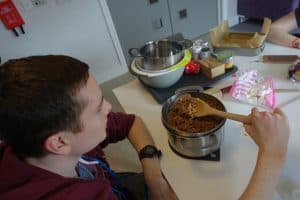In this short article, we discuss the importance of a nutritious diet as a key part of the rehabilitation process and a client’s journey to recovery at STEPS.
Nutrition plays a vital role in the rehabilitation process following an injury or illness and is a key part of the recovery process. At STEPS, we have a team of highly skilled chefs who are dedicated to not just cooking delicious and nutritious food, but also helping clients understand the benefits of good food on their bodies.
A specifically and carefully designed menu can provide a person with the energy, vitamins and nutrients that are needed for strength, function, health and wellbeing during their rehabilitation stay and beyond.
Our chefs work closely with clients to design menus which meet their different tastes and nutritional needs; we make food a part of their rehabilitation programme.
Food at STEPS
Planning for a client starts even before they arrive at our facility. The kitchen team receive information about their injury and any allergies that need to be catered for. Once a client arrives our chefs meet with them along with their nursing and speech and language team to identify how food can assist with their recovery. This enables them to create a bespoke meal plan that’s unique to each client.
For example, in some cases, clients who have suffered a spinal injury may struggle to regulate their bowel movements so its important to ensure that they have a high fibre diet.
For clients who struggle to swallow, food may need to be prepared using the International Dysphagia Diet Standardisation Initiative (IDDSI) framework. (This consists of 8 levels where drinks are measured (0-4) and food (3-7) for those with swallowing difficulties.
If a patient has difficulties swallowing, a speech and language therapist may recommend a ‘minced and moist’ diet which is soft and requires little or no chewing. By creating specific menus alongside the SLT, the chefs ensure that food is safe to eat by the client and that they are not at risk of choking.
Wellbeing
 Residential clients at STEPS are often with us for extended periods of time and their wellbeing and mental health can suffer as they adapt to being away from home, whilst coming to terms with their injury and engaging with the rehabilitation programme. A healthy diet can support mental well-being, and a well-planned menu can make clients feel ‘at home’ during their stay. Our chefs take the time to meet with clients and their families to design menus that include family favourites, such as a traditional Sunday roast with Yorkshire Puddings or, even a healthy take on a Friday night kebab! If clients request a specific meal that isn’t on the menu that week, our chefs are happy to make it, or order the relevant ingredients in for the next day!
Residential clients at STEPS are often with us for extended periods of time and their wellbeing and mental health can suffer as they adapt to being away from home, whilst coming to terms with their injury and engaging with the rehabilitation programme. A healthy diet can support mental well-being, and a well-planned menu can make clients feel ‘at home’ during their stay. Our chefs take the time to meet with clients and their families to design menus that include family favourites, such as a traditional Sunday roast with Yorkshire Puddings or, even a healthy take on a Friday night kebab! If clients request a specific meal that isn’t on the menu that week, our chefs are happy to make it, or order the relevant ingredients in for the next day!
Recently the clients at STEPS requested a more ‘Pub Grub’ themed menu and the kitchen staff created a menu that fit the bill perfectly.
We have an ‘open door’ policy in the kitchen and clients are always welcome to visit us for advice, or to give us meal suggestions.
Weight Loss
Many of the clients at STEPS are living with reduced mobility following an injury or illness, and a lower calorie diet that offers high levels of energy to support rehabilitation is often required.
Reduced levels of activity and weight management can often be a vital part of the rehabilitation programme for clients at STEPS, particularly for those who are now wheelchair dependent, or have undergone a lower limb amputation.
For amputee clients, weight gain needs to be carefully managed, as an increase in weight can make a prosthesis too tight and uncomfortable, and too much weight loss can result in the prosthesis becoming too loose.
The chefs work alongside the therapy team to create healthy, balanced diets that support clients in maintaining an even body weight.
Cooking as therapy
The food at STEPS is a huge part of a person’s stay with us. Our holistic approach to rehabilitation includes cooking as a form of therapy.
As well as serving, fresh, healthy food, tailored for each client, our therapists, occupational therapists and chefs also offer cooking and baking classes. These equip clients with skills such as meal planning and meal preparation, which are vital to helping them to take care of themselves during and after their stay at STEPS and supports them to live as independent a life as possible once they return home.

Many of our clients are aged between 16-25 and have never lived away from home, so cooking lessons with the chefs, learning how to make basic meals, and the importance of a healthy, balanced diet are hugely beneficial and practical lessons that they can take away from their time with us.
Cooking and baking can also develop fine motor skills, making activities of daily living once a client has returned home much easier.
In some cases, clients are not able to eat solid food and different tastes and textures can be used for sensory exploration. The kitchen staff, with direction from the speech and language team can develop pureed food for taster sessions, allowing clients a taste of their favourite food or meal.
Food for Thought
Meal times at STEPS are always sociable with clients, their families and staff all coming together in the café or shared spaces (transitional living unit and therapy kitchens) around the facility to share meals.
Enjoying mealtimes is a key part of the experience at STEPS and special menus are created, often at the request of clients.

In recent months we have had:
- Takeaway Evenings
- Homemade Pizza Nights
- Fish & Chip Fridays
Initiatives such as ‘Wonderful Wednesdays’ with afternoon tea, mocktails and cake for staff at 3pm were introduced during the COVID-19 pandemic to increase morale and have continued due to their popularity. Last weekend the café hosted ‘Tea and Talk’ on World Mental Health Day, aimed at encouraging staff and clients to use the café as a space to eat and talk.
It’s a Family Affair
The role of family and friends is fundamental to a client’s recovery and loved ones are always welcome at STEPS to support the rehabilitation journey. Family often visit STEPS and are able to share meals with their family, new-found friends and our staff members.
In October 2020, we introduced ‘restaurant night’, where clients can invite a guest to STEPS for a ‘dining-out’ experience at the ‘Chef’s’ table in a quiet space in the café, with a member of staff acting as a waiter or waitress. A client was able to celebrate their wedding anniversary with their wife, they were even treated to their own guitarist for background music!
Planning for Christmas
As a 24 /7 facility, we stay open throughout the year, which of course includes Christmas Day. 
As a family run business, we appreciate the importance of spending the day surrounded by the people you love, and ensuring clients are able to spend the day with their loved ones to enjoy Christmas Dinner has always been a priority during the festive period. In previous years, clients along with their families and the staff have all sat together to enjoy Christmas Dinner in the café.
This year, things may need to be done slightly different due to the current restrictions in place.
However, we are already putting plans in place that should allow clients to share their Christmas Dinner with their family as safely as possible.
